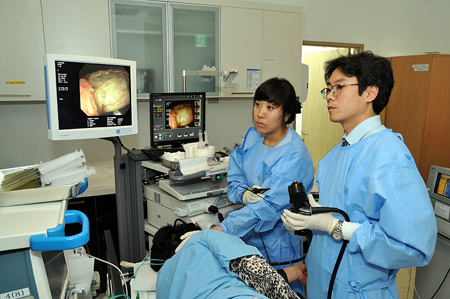Diet is tricky for stomach cancer patients

Doctor performs endoscopic submucosal dissection on a patient with early stage stomach cancer. This procedure, much less invasive than gastrectomy, can remove lesions with low chances of complication. / Korea Times file
Stomach cancer is the most common cancer in Korea and kills about 10,000 people every year.
It is the most prevalent carcinoma among men (20.7 percent of all cancer cases in 2008) and the third most common in women after thyroid and ovarian cancer (10.7 percent).
Experts point to the salty Korean diet, high alcohol consumption and exposure to Helicobacter pylori (a microaerophilic bacterium found in the stomach) as the main reasons for the disease’s prevalence in Korea.
Fortunately, it is one of the few curable cancers if detected in the early stages. Newly refined endoscopic techniques can completely remove the tumor site with minimal injury to the body.
Yet, gastric cancer often does not exhibit symptoms; thus a routine check-up is key to timely treatment ― the government recommends adults over 40 should be examined for abnormalities in any parts of the stomach.
As gastric care requires long-term commitment, it is crucial for the patients and their caregivers to understand the necessary diet changes, treatment option, and side effect managements for chemotherapy.
At a forum for patient and their families on Wednesday, Song Seung-eun, a dietitian at Yonsei University Severance Hospital, said many patients are mistaken about what is a healthy diet for cancer patients. Unlike, patients without gastric problems, those who have undergone procedures for stomach cancer should refrain from brown rice and simple porridge.
Also, it is dangerous to avoid salt, though a salty diet can cause stomach cancer. Song also urges patients to not just consume commonly known “super” foods or anti-cancer ingredients ― a skewed diet can prevent protein from regenerating cells killed in chemotherapy.
As excessive salt can cause problems in the stomach lining, many patients stop adding salt to their food altogether after diagnosis or surgery. “You have to understand that salt is a problem only if you take too much of it. It is a crucial building block of our body,” she said.
Cutting out salt is dangerous also because it can result in a serious loss of appetite. “Stomach cancer patients already suffer from low appetite. Food that barely tastes like anything will worsen this and eventually lead to weight loss ― this complicates any kind of treatment and delays recovery.”
Substituting brown rice for white rice can boost nutritional value to the average person. However, the unpolished grain contains significant fiber, which can harm cancer patients with weakened stomach functions. Similarly, cooking rice with different grains is not ideal for stomach cancer patients who can’t chew well. Rice cakes can be detrimental to those with removed tumors– patients are likely to swallow large pieces without chewing, and the food can attach itself to the operation site.
“The single most important nutrient for people going through chemotherapy is protein,” Song stressed. While porridge is a popular choice for people who have a compromised digestive system, one must supplement a carbohydrate rich dish with protein. Options include adding meat, eggs, or ground nuts. For a regular diet, people avoid egg yolk because it contains fat and cholesterol. However, egg yolk is a great source of vitamin and minerals for cancer patients.
Protein is crucial to staying healthy through chemotherapy. Chemotherapy kills cells that reproduce fast as cancer cells are known to grow rapidly; however, it also destroys normal cells that make up skin or hair that also have a high growth rate.
Therefore, patients need to intake protein which helps cell generation. Experts say the type of meat does not matter as long as one can absorb protein effectively. Meat broth, often used in noodle and stew dishes, actually does not contain much protein. One must avoid raw meat or fish, as well as meat that is over cooked. For those who do not eat meat, soy bean, eggs and seafood are great substitutes.
Cancer patients are advised to consume at least two to three servings of vegetables a day. Similar to brown rice, greens are rich in fiber. Therefore, steamed or stir-fried vegetables are easier to digest for people with compromised gastric system.
Cancer patients need to prevent weight loss by consuming sufficient calories everyday _ if the meal option does not meet the requirement, adding fat is a solution. One can try fried fish instead of broiled or steamed fish, and eat mashed potato salad in place of simple boiled potato. Nuts contain fat and protein as well. Unsaturated fat or lipid substance from vegetables is healthier than saturated or animal fat.
Consuming enough fat is essential to allowing protein to reproduce cells. If there is not enough fat, the body will use up protein for energy.
Eating on chemotherapy
People lose their appetite in chemotherapy, develop mouth sores and feel nauseous. It is important to eat throughout the day in small portions and avoid drinking water with the meal.
Patients either feel nauseous on the medication or two to three days later following treatment. One should try to eat before he or she feels hungry because nausea can get worse if the stomach remains empty.
When someone gets mouth sores from the therapy, avoid hot or spicy food and eat shakes or porridge. One can use straws to minimize contact with the mouth.
If the patient has diarrhea from the treatment, avoid food that contain caffeine and replenish the lost nutrients with isotonic drinks and food that contain potassium such as bananas. <The Korea Times/Noh Hyun-gi>





















































